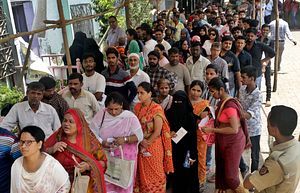Now that the fourth phase of the election for India’s Lok Sabha has concluded, the verdict is less than a month away. The election results will decide who will form the next government in the world’s largest democracy. If opinion polls are anything to go by, the Bharatiya Janata Party (BJP) looks like to retain power only by forming a coalition government following the election.
The recent escalation following the Pulwama attack and subsequent hostile engagement between India and Pakistan has raised the importance of the Indian election in Pakistan. Pakistan will be keenly interested on May 23 whether the BJP will be able to retain its government, even with a coalition of regional parties, or if an anti-BJP alliance will triumph.
From a Pakistani perspective, these Indian elections hold significant importance. Anyone who comes in power in India will affect India’s relationship with Pakistan and the approach that the incoming Indian government takes on all the outstanding issues, including Jammu and Kashmir. Apart from bilateral engagement, India-Pakistan relations will also structure the future of the South Asian Association for Regional Cooperation (SAARC), a regional forum for South Asian countries. It is important to remember that Indian Prime Minister Narendra Modi refused to attend the 19th SAARC summit in Islamabad back in 2016, which ultimately led to a regional boycott of the summit. Simultaneously, the Indian election holds significance with regard to recent developments in Afghanistan. In all, the Imran Khan government is keeping a keen eye on the Indian election.
Khan has already thrown support behind the incumbent BJP. The reason, Khan explains, is that the possibility of achieving peace is more likely to materialize with the BJP in power. Khan’s belief is rooted in previous Pakistani interactions with BJP politicians (particularly Atal Bihari Vajpayee’s 1999 Lahore visit and the failed Agra summit of 2001). However, both these initiatives proved to be short-lived because of the Kargil conflict and the Indian Parliament attack in December 2001, respectively.
Khan believes that a Congress-led government would be too apprehensive to pursue peace in anticipation of a possible backlash from right-wing elements. If history is to be looked upon for future direction, the surprise routing of BJP in the 2004 election and its charged rhetoric regarding Kashmir and Pakistan constrained the Manmohan Singh government. Singh’s outreach efforts to Pakistan could not take off properly due to BJP’s strong opposition.
This time around, the complexity for Congress is furthered by the Modi-led government which has responded to deadly militant attacks in Indian-administered Kashmir with “surgical strikes” inside Pakistan and flaring of hostility on the Line of Control, the de facto border demarcating the Indian and Pakistani-controlled sides of Jammu and Kashmir, and on the international border between the two countries. According to Indo-Pak Conflict Monitor, both countries are responsible for a cumulative 629 ceasefire violations since the assumption of Modi’s government in May 2014.
A review of the election manifestos of both the BJP and Congress, with respect to the bilateral relationship with Pakistan, shows striking dissimilarity. While the BJP’s election manifesto remains silent on the future course of the relationship with Pakistan, the National Security Strategy authored by retired Lt. Gen. Deependra Singh Hooda, has been incorporated in Congress’ election manifesto and has called for the following actions:
- Diplomatic and economic isolation of Pakistan as part of long term strategy to pressurize Pakistan from “sponsorship” of alleged terrorism.
- Unilateral, limited military action against “terror groups” inside Pakistan when needed.
- Structured dialogue process whose progress should be conditioned with visible results.
- Serious dialogue between the two countries on nuclear issues.
However, Modi’s first-term track record indicates that high hopes should not be attached to his second term regarding possible positive engagement between the two neighboring countries. Despite a few positive gestures like inviting Nawaz Sharif for Modi’s swearing-in ceremony and the surprise Lahore stopover on Christmas Day 2015, anti-Pakistan hostility has increased significantly under the BJP’s rule.
If recent historical trends are kept in mind, a meaningful breakthrough between two neighboring countries is only likely to be achieved in the early months of the future Indian government, sans a major militant attack in Indian-administered kashmir or terror attack in mainland India.
With Pakistani authorities involved in a crackdown of anti-India militant outfits, the onus of breaking the deadlock for peace talks now lies with the future Indian government, which has long demanded action against those militant groups. The impasse can be broken only by addressing all the issues, including the Jammu and Kashmir dispute, with a sense of maturity. Consequently, both countries not only can benefit economically but can transform South Asia, which is one of the least integrated regions of the world, into a regional economic hub.
Fahad Nabeel is working as a Senior Research Associate at Centre for Strategic and Contemporary Research. Fahad is on Twitter @fahadnabeelfn.

































